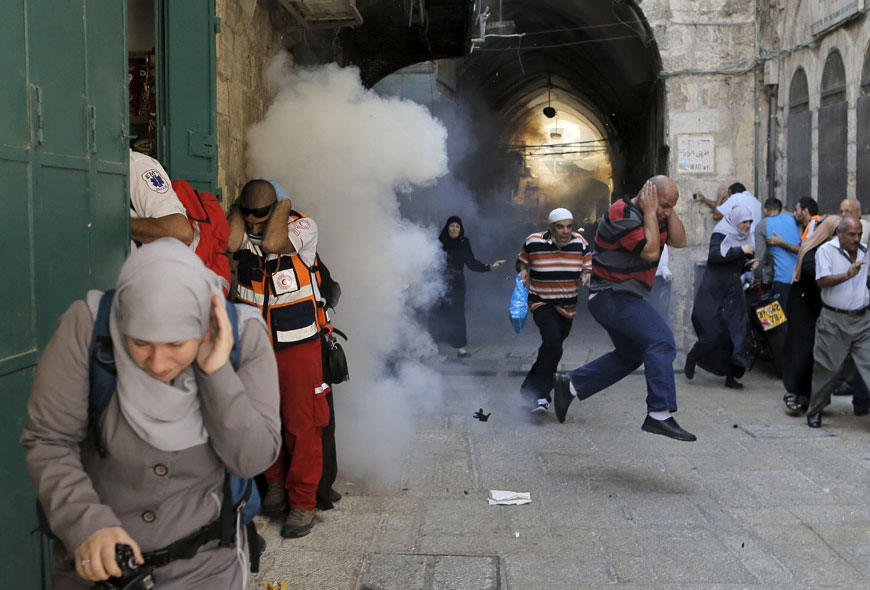OCCUPIED JERUSALEM — New clashes broke out Monday between Palestinians and Israeli forces who stormed Jerusalem's flashpoint Al Aqsa Mosque compound, as an expected increase in Jewish visitors to the site over the Sukkot holiday boosted tensions.
Israeli forces fired tear gas and stun grenades, while young masked protesters who had pledged a day earlier to defend Al Aqsa threw stones before barricading themselves inside the mosque itself, an AFP journalist reported.
According to Israeli forces, the young protesters had slept overnight at the mosque and also hurled petrol bombs at forces during the clashes, which caused a small fire at the entrance to the building.
Sources in the Jordanian-run organisation that administers the site, the Waqf, told AFP that Israeli forces stun grenades provoked four fires inside the building that were brought under control.
The Palestinian Red Crescent reported 22 people were wounded, with three hospitalised after being hit by rubber bullets, including one person struck in the face while inside the mosque.
Israeli forces said negotiations to have the youths leave had failed, leaving them no choice but to carry out the raid to keep them from disrupting visits to the site.
Dozens of officers deployed, including on the mosque's roof, and Israeli forces rolled a moving wall to the mosque's front door to shut Palestinians inside and block projectiles being thrown.
Muslim worshippers who were at the compound after morning prayers as the raid began were forced to leave by Israeli forces and all gates used by Muslims to enter the site were closed. Some remained near the gates and chanted in protest.
Regular visits by non-Muslims permitted between 7:30am and 11:00am were then allowed to go ahead, according to Israeli forces, with more than 700 visiting, including 43 Jews. Calm later returned to the site.
Stones and barricades
The compound has been the scene of repeated clashes in recent weeks, provoking international calls for calm. The highly sensitive site is the third holiest in Islam but is also known to Jews as the Temple Mount, the most sacred in Judaism.
Palestinian President Mahmoud Abbas, who will address the UN General Assembly on Wednesday, has warned of the risk of a third Intifada, or uprising, if volatility at the site worsens.
Recent weeks have seen a series of Jewish holidays which have led to an increase in visits by Jews that have sparked clashes. The same situation is feared over Sukkot, an eight-day religious feast that began on Sunday night.
Jews are allowed to visit the site, but cannot pray to avoid provoking tensions. Muslims fear Israel will seek to change rules governing the compound, which is located in Israeli-occupied East Jerusalem.
Israeli Prime Minister Benjamin Netanyahu has said repeatedly he is committed to maintaining the status quo despite the views of some hardliners within his governing coalition.
A campaign by a hardline Jewish minority to build a new temple at the site has further stoked suspicions.
Brief clashes had also broken out on Sunday, and afterwards young Palestinian protesters were seen preparing to defend the mosque during Sukkot, stocking stones inside the shrine and barricading doors.
Visits by Jews were stopped and age restrictions on Muslim men entering the compound lifted during the Muslim holiday of Eid Al Adha, which was celebrated from Thursday to Sunday.
However, a ban on Muslim men under 50 was re-imposed as Sukkot started.
‘A national symbol’
Jews celebrate Sukkot to commemorate their journey through the Sinai wilderness to the holy land after their exodus from Egyptian slavery.
The radical northern branch of the Islamic Movement in Israel and the Higher Arab Monitoring Committee, which represents Arab communities in Israel, had urged Muslims to go to the compound to defend it on Sunday.
“Al Aqsa is a holy place, but it is also a national symbol for Palestinians and all Arabs,” Sheikh Kamal Khabit, deputy head of the Islamic Movement, said.
“Jewish extremists want to destroy Al Aqsa to build a third temple.”
According to Biblical tradition, the first and second Jewish temples were located at the site of Al Aqsa compound and destroyed by the Babylonians and the Romans.
This month over the Jewish New Year holiday, or Rosh Hashanah, Israeli forces raided the compound to stop what they said were plans by Palestinian youths to disrupt visits to the site. Clashes occurred over three consecutive days.
Israel occupied East Jerusalem, where Al Aqsa is located, in the 1967 war and later annexed it in a move never recognised by the international community.
